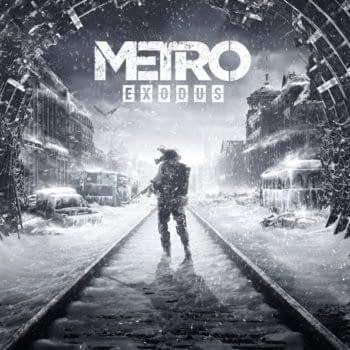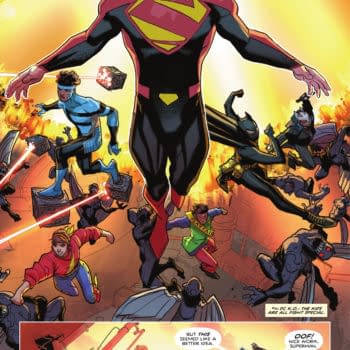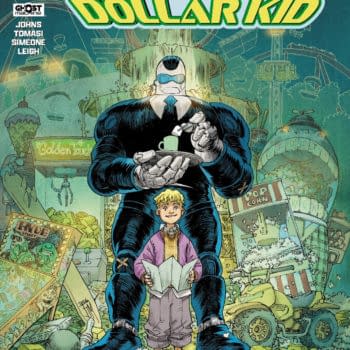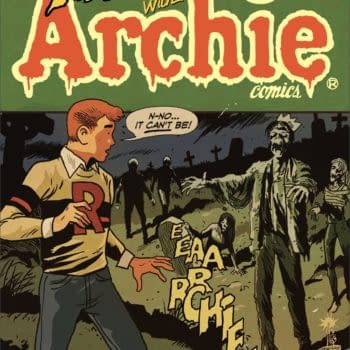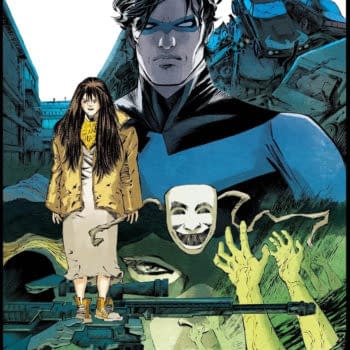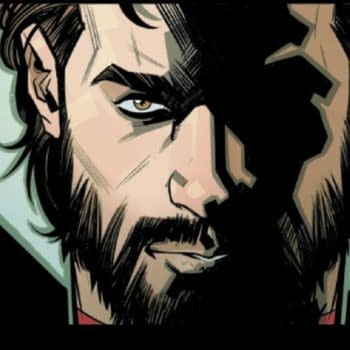Posted in: Comics, NYCC | Tagged: charles soule, Comics, entertainment, jim zub, NYCC, writing
So You Wanna Write Comics? Tips and Tricks from Charles Soule and Jim Zub At NYCC

Are you one of the many people who attend New York Comic Con with eyes filled with starry hope for the future? When you read your favorite titles, do you ever put down the book and say "man this is what I want to do, but I just don't know how to get started." Well lucky for you two of the industry greats, Charles Soule and Jim Zub are here to help. What makes you even luckier, is I have decided to pass down their very informative panel, to you.
1. Going to conventions and networking: That's right folks, New York Comic Con can help your career. Both Zub and Soule couldn't stress enough that conventions, while being tons of fun, are also excellent places to meet and network people in the industry you hold so dear. Next time you decide to shell out a load of money for that con ticket, make sure to mix in some business with your leisure.
2. Patience: Yes, yes patience is a virtue. This one may sound cliché at first, but it is all too important. In a candid moment, Soule went on to tell the audience that his journey into comic books took nine years before it blossomed into what it is today. So don't freak out that you aren't writing the next big thing for the big two. You have time. As Soule said, "you have to build the trees for the wood to make your home." Zub echoed the sentiment and urges aspiring writers to "grind it out year after year." He explained that nobody just "explodes onto the scene" no matter how spontaneous their success may seem. He regrettably informed the crowd "getting your first gig isn't easy" but made sure to hammer home that this journey will take a while. As Soule said, "just because you're not writing where you want to be, doesn't mean you won't get there."
3. Knowledge: This does not simply mean knowledge of the craft of writing. Nor is it limited to knowledge of canonical history of characters, names, faces, and dates in the comic book industry. Zub insisted that to be effective in the comic book world you have to "learn as much as you can about the entire pipeline." He continued to break this point down in the simplest of terms, "The more you know about other people's jobs, the easier you make their lives. People want to work with people who make their lives easier.
4. Size isn't everything: Well at least in this case. Soule insisted that starting out with a "50, 60, 100 issue series will never get picked up." He gave the cold hard truth that "you need to be known enough to have someone invest in that." At this point Soule introduced the idea of a "a profile." Your profile as a writer will determine what kind of work you can get, and who you can get to assist you. It's a huge mistake to try to aim too high at first, as it will simply cost you money and disappoint you. As an alternative, Soule suggested to start with "stories that can be encapsulated in 4 or 6 issues at most." Zub suggested a technique for aspiring writers. "Start with one page scripts about little ideas. Write a date, write a day in the rain, write a fight scene. Then, combine them, write about a date in the rain during a fight." Refusing to be outdone by Soule's metaphors, Zub offered "If you wanna run a marathon you don't buy shoes and say, ok 10 miles let's go!" You have to start small and improve your craft.
5. FINISH IT: Both Soule and Zub agreed no editor is going to look at your script. No one is going to invest in your "idea" without holding something in their hand. You don't have the profile for that yet.
6. Self-Publish and be active: "Nowadays there are no barriers, use the internet to your advantage." In today's day, comics are more accessible than they've ever been. The industry is growing like never before and self-publishing is on the rise. Whether its digital or print, you need to have a completed work ready to go. "If you want to write for the big two, they come to you, they don't take pitches." A harsh reality as Soule explained, "They'll come to you if they've heard of you through other projects from smaller, let's say, 'B tier' publishers. Problem is today 'B tier publishers' won't take your pitch either, you need to start smaller than that.
7. Collaborate with artists at your level: This goes back to the idea of the "profile" Soule touched on earlier. "Good art costs a lot of money" Zub pointed out "and you need good art to be taken seriously. It isn't fair, but if your art is bad, the editor won't take the writing seriously. It's the first thing they see. This is a visual media." You simply won't be able to contact an established artist to work on your piece, and if they do agree, they're going to ask an exorbitant amount of money. The reason for this is, you are sadly unknown, and they are not going to want to invest in you or your idea. As Zub said "you gotta show you can create consistent and professional work before people will pay you for it. Not all is hopeless though, Soule suggested to "Go to grad art shows in your area, search the internet, the talent is there." As Zub so eloquently put it "fight in your weight class."
8. Ask yourself "why me?" They didn't mean this in a depressing way, quite the opposite in fact. Why would an editor want to read your work? Almost equally important to perfecting the craft of your writing, is perfecting the craft of the pitch. Soule really hammered this point and said the mentality you want to have is "get in quickly, and get out even quicker." He explained a bad pitch that goes on and on "glazes over an editor's eyes" and quickly turns them off. Leave them asking for more, you want them asking questions. If your pitch makes the editor ask, "well what happens next" you nailed it.
9. This is a Job: For many it's a dream job, but it is still a job and a potential career. Your attitude must reflect this. Zub warned against being "unbelievably fanish." Being too excited, and too unprofessional will lead editors to question if you can actually do this, or just want to do it really bad. This is especially important at conventions. When meeting industry people, be genuine and earnest but don't shove your comic book knowledge in their face. Zub urged aspiring writers to talk about "other people's work" and not always your own. Showing an interest in someone, may have them return the favor in the future. The difference comes down to "hunting and fishing." You don't want to hunt, that is "to zero in on one editor, or PR rep, or anyone in a company and hound them incessantly. Yes, this will get you known, but in a bad way. You don't want that person thinking "oh god, here comes this person again" because you try to hunt them down at every convention. Instead, "fish" put out a bunch of lures, introduce yourself and be friendly. When you feel a tug, then you real that person in.
10. Do the work you are passionate about: Do not chase the fads. What's popular now is because someone went and made it popular. The worst thing you can do is "cram a bunch of popular stuff into your book." You want to make your book "stand out with your individual passions." Don't forget your own personal knowledge, as it is your greatest assets. "People are attracted to genuine writing" they don't want you to just mimic trends, people want you to stand out even if it's in a well-established genre. As Soule put it, "everyone's life has a story in it, write what you know, but try to know a lot."
There you have it folks, 10 tips from two of the greats! Happy writing.





